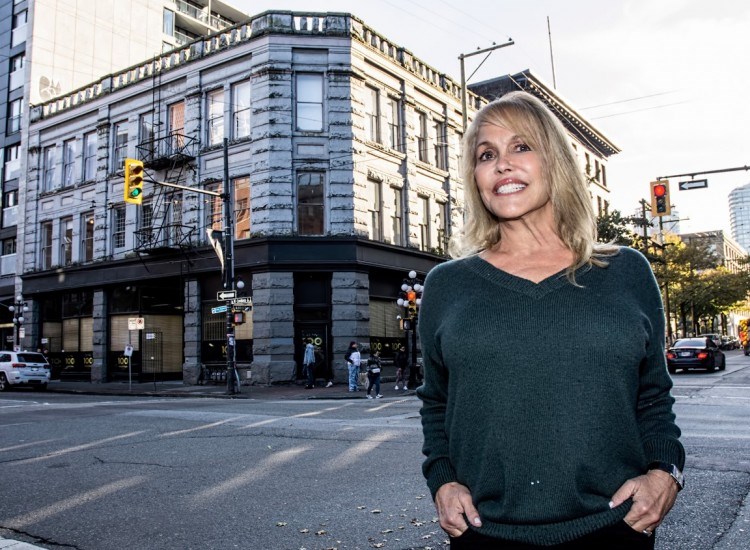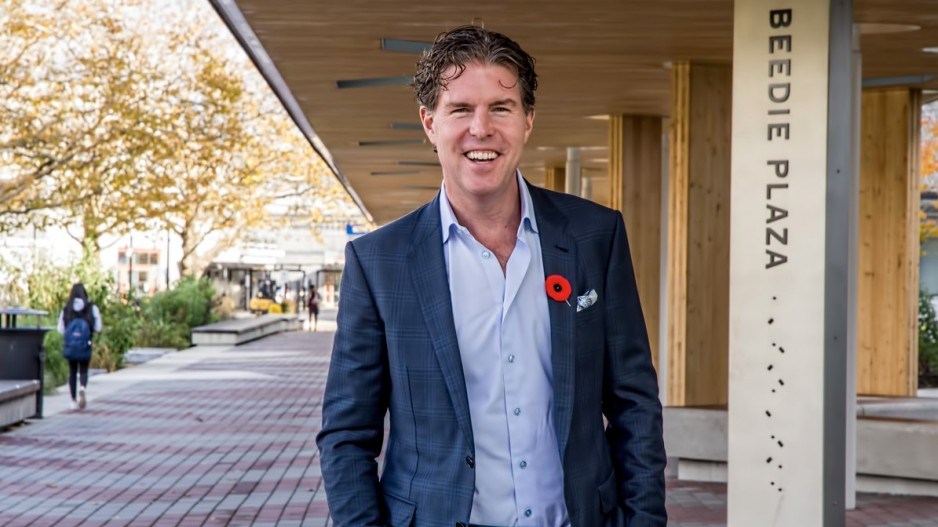If you want to get a rise out of Chip Wilson, mention the October Bloomberg article that discussed his fight with a rare form of muscular dystrophy and his commitment to spend lavishly on financing research into finding new treatments.
Facioscapulohumeral muscular dystrophy (FSHD) is weakening Wilson’s body to the point that he could be relegated to a wheelchair within five years, he told BIV.
That is why he last year committed $100 million to fight the degenerative disease by creating a new organization named Solve FSHD.
Wilson’s rare disease is estimated to affect one in 8,333 people. What’s more is that Wilson has a rare form of that disease that is said to affect only five per cent of those who have FSHD.
The recent Bloomberg article noted that “by putting such a fortune into curing one form of muscular dystrophy, he’s drawing away resources and attention that might otherwise be devoted to some other awful disease that could be more widespread or more curable.”
The piece questioned the wider societal effects of having billionaires shape where health care money is funnelled, and sometimes which disease cures get found.
Wilson slammed the article, and its author, for being “woke,” and he sounded indignant that anyone would deign tell him what he should spend his money on.
“In that article, does it say anywhere that I worked for 40 years, 18 hours a day, seven days a week to get where I am?” Wilson asked rhetorically. “I risked everything. I nearly went bankrupt five times and couldn’t feed my family.”
He then suggested that much health research is funded by government.
“I’ve also paid like, half a billion dollars in taxes,” Wilson said.
“We all pay taxes. I pay way more than anybody else. So if there is a disease that is affecting a great percentage of people, such as cancer and heart disease and everything else, well that’s where government puts their money.”
BIV spoke with other wealthy philanthropists about Wilson’s financial contributions to target FSHD and they said they would act similarly if they or a member of their families had a rare disease.
“If I had some disease that was going to put me in a wheelchair in five years, and I had billions of dollars, I’d do exactly what Chip Wilson has done,” Face The World founder and president Jacqui Cohen told BIV.
Bloomberg estimated Wilson’s net worth earlier this month at more than US$7.4 billion.
Beedie owner Ryan Beedie echoed Cohen’s sentiments.
“That’s his prerogative,” Beedie said. “He pays his taxes and other stuff for things that government is going to do.”
Beedie said that if Wilson did not support the cause to find treatments for FSHD, money would likely not come from other sources.
“Look at the impact that Michael J. Fox has had for Parkinson’s Disease – it’s been game-changing,” Beedie said.
Wilson’s philanthropy, however, does not stop at financing various companies to find potential FSHD treatments.
He and wife Summer Wilson, through the Wilson 5 Foundation, last year donated $100 million to the BC Parks Foundation to protect and enhance the province’s natural park system. He had previously made a $4 million donation to protect the coastal Douglas-fir ecosystem.
“The idea was to be able to secure land to be parkland forever,” he said.
“I’m so thankful, every day, that somebody had the foresight to do Stanley Park. I bet there were people at that time who went, ‘Oh, why do this? There’s so much land around here, who cares about a park in Stanley Park?’ but you go 100 years into the future. We can get, I don’t know, about four million acres in northern B.C. and keep it like that. It’s pristine, it’s gorgeous. It’s beautiful.”
Saving nature is a cause is that governments have recently rallied behind. The federal and provincial governments on Nov. 3 announced a partnership with the First Nations Leadership Council that would see governments provide $1 billion to protect old-growth forests and at-risk species in the province.
Another of Wilson’s donations was his family’s $8 million contribution to Kwantlen Polytechnic University in 2018, which helped create the Wilson School of Design to train future fashion and technical apparel designers.
Society’s wealthiest relied upon to give back
With wealth comes duty.
It’s a concept that goes back centuries, and it inspired writer Honoré de Balzac, in 1836, to coin the well-known French phrase Noblesse Oblige to convey that the nobility has obligations to society.
Later that century, respected American industrialist and business magnate Andrew Carnegie advocated for the emerging upper class of self-made rich men to share their fortunes with society.
Carnegie wrote a pivotal essay that furthered an early concept of philanthropy, according to David Silver, an associate professor and director at the W. Maurice Young Centre for Applied Ethics, and the chair in business and professional ethics at the Sauder School of Business at the University of British Columbia (UBC).
“There’s long been a view that the ultra-wealthy in society have an obligation to devote some part of their wealth to philanthropic causes,” he told BIV.
“This goes back to Andrew Carnegie, and his Gospel of Wealth [essay] in the late 1800s.”
Carnegie financed a range of public projects, including building the Carnegie Public Library at the corner of Main and West Hastings streets and more than 2,500 other public libraries around the world.
Noted Vancouver-based philanthropist Frank Giustra has frequently mentioned Carnegie in speeches as being an inspiration for him to give back to society.
Giustra is likely best known for in 2007 donating US$100 million plus half of what he earns in the resource industry during his lifetime to the Clinton Giustra Sustainable Growth Initiative to fight poverty in areas affected by the resource sector.
“There are ladders of charity,” Silver said. “It might be more praiseworthy, from a certain sense if you donate anonymously, but it is still good if you donate with your name.”
A lower step on the ladder of philanthropy might be when an über-wealthy individual donates a significant sum to a cause that affects him or her personally, Silver said.
Wilson’s financial commitment to find cures or treatments for FSHD fall into this category, he added.
“Many people believe that there’s an obligation for the super-wealthy to devote some part of their wealth to philanthropic purposes,” he said. “[Wilson’s FSHD donation] doesn’t fulfill that obligation, in my opinion, but it’s a lot better than other spending by the ultra-wealthy, such as shooting themselves into space or buying a luxury yacht.”
Regional affinity inspires philanthropists
Giving back to the Downtown Eastside community is a passion for Cohen.
Her grandfather, Sam Cohen, bought a significant chunk of the city block bounded by West Hastings, Abbott, West Cordova and Carrall streets, and located a large Army & Navy department store there soon after founding the company in 1919.
Cohen closed what was a five-store chain in 2020 and has partnered with Bosa Properties in an effort to get rezoningapproval to build an 11-storey office tower and a 19-floor residential tower on land where the downtown Vancouver store previously operated.
To the west, at the corner of West Cordova and Abbott streets, stands a building Cohen calls The Abbott. Her plan is to turn that building, which she owns, into a “social-enterprise building” for her Face The World charitable foundation.
“Whether it’s going to be partly women’s housing, partly for mental health [recovery] – I don’t know the details,” she said. “I just know now that this building is going to be part of my legacy for Face The World, and I’m very excited about that.”
Face The World has provided grants to more than 400 charitable organizations in its 33 years in existence.

Like with Cohen, philanthropists and corporations often donate to causes in communities in which they live or do business.
Beedie and his company are both like that.
He and his wife Cindy Beedie in October announced a $5 million donation to the Delta Hospital and Community Health Foundation to help build a long-term care facility, Beedie told BIV.
“We’ve done a lot of work in Delta over the last 30 years,” he said. “We have an obligation to invest money back into that community, which has been very good for us.”
His company’s head office is Burnaby, where he grew up, and that connection helped spawn his family’s $8 million donation in 2020 to the Burnaby Hospital Foundation for the Burnaby Hospital’s Beedie Pavilion.
In 2011, Beedie and his father, Keith Beedie, donated $22 million to Simon Fraser University (SFU) to create the Beedie School of Business.
“What an exclamation mark behind a ‘thank you,’ that was, right? I mean our business and my life and career wouldn’t be what it is, had it not been for that experience at SFU [in Burnaby.] So there’s that loyalty.”
On Nov. 3, the province broke ground on the Cindy Beedie Place in Burnaby. Cindy Beedie and some anonymous donors announced a $1 million contribution a day earlier to help bring to fruition the project that would create 56 homes to help women and children fleeing violence.
Accountability and encouraging others to donate
On Ryan Beedie’s 50th birthday, five years ago, he earmarked $50 million to create the registered foundation and non-profit society Beedie Luminaries, which aims to remove barriers to higher education for students who face financial adversity.
His passion to create the foundation came in part because he was inspired by the thanks he received from students at SFU, who appreciated his gift to their university, he told BIV.
He said that when he was growing up in Burnaby, he made friends with people who were situated across the economic spectrum. Some of them could not afford to buy him a birthday present, and he learned at a young age why this was OK.
Beedie did not want people in dire financial situations to forego higher education because of the cost, he said.
Like Wilson, whose Solve FSHD often wants to see results on investments before injecting new money into research ventures, Beedie also takes efforts to ensure that money spent on scholarships is spent efficiently.
“Everything is measured – from the percentage of students who graduate to academic performance,” he said. He is now evaluating how to tweak the program and where to put new money, given that many of the first scholarship recipients graduated in May, he added.
Another of Beedie’s philanthropy strategies is to use his donations to inspire others to give.
He financed bringing Blondie, Bryan Adams and other performers to Malkin Bowl on Aug. 12 for what he called a Beedie Rocks concert for invited guests.
He told all of his invited guests that they needed to donate to the Greater Vancouver Food Bank (GVFB) in order to gain entrance.
Beedie and his wife Cindy then double matched all money raised.
Rob Fiorvento, who is managing partner at the development company Beedie, donated approximately $50,000, Beedie said. So did Seaspan Marine executive chair Kyle Washington.
Countless others likely donated more than they would normally have provided because they knew that for each extra dollar they gave, the food bank would get $3.
At the end of the day, the event raised more than $2 million for the GVFB.





